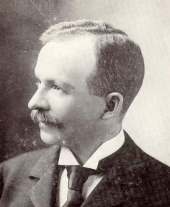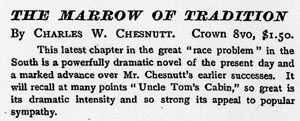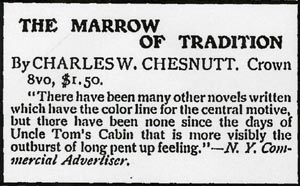 |
The son of "free blacks," Charles W. Chesnutt was born in 1858, six years after Uncle Tom's Cabin appeared. By the early 1880s he knew he wanted to be a writer, and had read Stowe's novel more than once. Along with Albion Tourgee's 1879 novel about Reconstruction, A Fool's Errand, Uncle Tom's Cabin remained for him an inspiring example of a book that dramatized "the problem of the color line" in a way that both reached and moved the white reading public. As he wrote his publishers about his second full-length fiction, "If 'The Marrow of Tradition' can become lodged in the popular mind as the legitimate successor of 'Uncle Tom's Cabin' and the 'Fool's Errand' as depicting an epoch in our national history, it will make the fortune of the book and incidentally of the author, which would be very gratifying.'"* |
|
As a text, Chesnutt's Marrow is not in direct conversation with Stowe's text, but as you can see in the ads below left, Houghton Mifflin emphasized the relationship; perhaps following that cue, several of Chesnutt's reviewers discussed his novel in the context of Stowe's, as you can see from the ten reviews available below. Other readers made the same comparison, including one of Chesnutt's cousins; in reply, Chesnutt wrote: "I thank you for the comparison with Uncle Tom's Cabin; if I could write a book that would stir the waters in any appreciable degree like that famous book, I would feel that I had vindicated my right to live and the right of a whole race."* |
|
 CLICK EITHER IMAGE TO SEE ENTIRE AD  |
(27 October 1901) (November 1901) (2 November 1901) (3 November 1901) (9 November 1901) (19 November 1901) (7 December 1901) (14 December 1901) (21 December 1901) (28 December 1901) |
